Alumni across the country and around the globe are expanding the university’s influence and impact.

In the past decade, Elon has become a university of national scope, drawing large numbers of students from states that previously weren’t even on the recruiting radar.
This year, 73 percent of Elon students are from outside North Carolina. In fact, this fall, Elon finally achieved the long-sought-after distinction of drawing students from all 50 states, when Laurie Heggedal from North Dakota enrolled as a member of the Class of 2019. “I liked the idea of going away to college and seeing new things,” Heggedal says. “I’m talking about Elon with my friends who are seniors in high school in Fargo, and I’m posting lots of Instagram pictures.”
Elon’s continued expansion of its student recruitment territories coincides with the university’s upward trajectory in quality and academic reputation. Admissions staff members are finding strong interest in Midwestern and Western states where Elon was previously unknown. Elon staff regularly meet with prospective students in cities such as Chicago, St. Louis, Denver, Houston, Dallas, San Francisco and Los Angeles. And expanded international recruiting staff are focused on working with students in China, India and Brazil, among other countries. “All Elon students benefit when our community is more reflective of our nation and our world,” says Greg Zaiser ’90 G’95, vice president for admissions and financial planning. “Each student brings to Elon a unique set of experiences and perspectives and this creates a very vibrant learning environment.”
Zaiser and others attribute the tremendous growth in awareness of Elon to the thousands of alumni and parents who are spreading the word and demonstrating the powerful advantages of an Elon education.
“Our alumni network now stretches around the world, and that is a big advantage in our emerging admissions markets,” says Brian Feeley ’03, Elon’s director of alumni engagement. “We have 36 alumni chapters worldwide. No matter where you go, you will find smart, hardworking and inspiring Elon alumni who are doing amazing things and making our world a brighter place.”
The influence of alumni will be a key factor in the continued growth of Elon’s reputation. The stories on the following pages demonstrate the ways Elon graduates are serving as the ethical leaders and creative problem-solvers our world needs.
A leader on and off the pitch
“Thanks to Elon, I’m a better leader because I can synthesize wide-ranging perspectives and unite them into focused action.” —Clint Irwin ’11, professional soccer player
Clint Irwin ’11 grew up watching some of the greatest soccer stars in the English Premier League. Little did he know that one day he would be sharing the pitch with some of them.
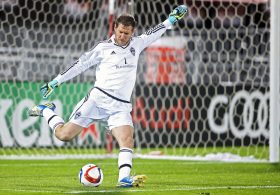
But Irwin’s accomplishments don’t end after the final whistle blows. As a representative for the MLS Players Union, he represents his team in meetings with ownership and the league. This past season, he took part in the Collective Bargaining Agreement negotiations that resulted in free agency for the first time in the league’s history and significant salary increases for the players. He credits the critical-thinking skills and pre-law courses he took at Elon for his successes in that role. “The educational experiences gained at Elon have come in use nearly every day of life after college,” Irwin says. Playing for the U.S. National Team and eventually joining a European club are among his dreams, and while these are not easy tasks, they are not unattainable for Irwin. “The university instills a humbleness but also an intellectual steel to its graduates that serves us well in whatever we pursue,” he says. “It’s a feeling of, ‘Yeah, this is difficult’ or ‘I’ve never done it before,’ but also ‘I believe I can do it—and I’m going to do it.’”
Merging passions
“Beyond academics, Elon instilled in me strong personal values that have helped me sustain a long-term vision.”—Amanda Brown Marusiak ’10, epidemiologist consultant with ExxonMobil
Amanda Brown Marusiak ’10 was always good at math and passionate about service, but it wasn’t until she came to Elon that her interests and skills merged, leading her to a career in a field she didn’t even know existed.
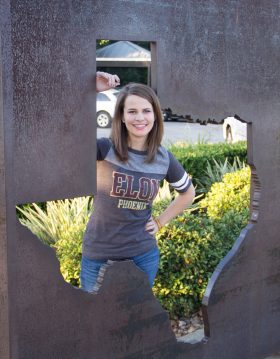 Her interest in global development led her to become a Periclean Scholar. Her cohort’s project was to sustainably support the construction of a health center in rural Ghana, which inspired her undergraduate research in mathematically modeling the spread of malaria. Thanks to faculty mentors, study abroad and research experiences, as well as the Periclean and Lumen Prize programs, she found her calling in public health.
Her interest in global development led her to become a Periclean Scholar. Her cohort’s project was to sustainably support the construction of a health center in rural Ghana, which inspired her undergraduate research in mathematically modeling the spread of malaria. Thanks to faculty mentors, study abroad and research experiences, as well as the Periclean and Lumen Prize programs, she found her calling in public health.
After graduation, Marusiak obtained a master’s degree in epidemiology at the University of Texas at Houston and went on to work with infectious disease programs in the oil and gas industry. She recently returned from two years living in South Korea, where she worked with the Middle East Respiratory Syndrome outbreak. She is proud of her alma mater’s increased presence in the Houston area and hopes to continue connecting with the alumni network there. “My first couple of years in Texas, there wasn’t a real good sense of the Elon community,” she says. “Now when you talk to people, you’ll find someone who has some sort of connection with Elon. It’s obvious the university is trying to put a stake here.” She looks back at her time at Elon with appreciation to the mentors who supported her in both a research capacity as well as academic advising. “Interpersonal relationships, particularly with faculty mentors, are one of the highlights of an Elon experience, and mine is no exception,” she says.
Connecting the dots
“That Elon community that was so valuable to me [as a student] is still valuable to me today.” —Amy Reitnouer ’09, executive director of The Bluegrass Situation
Amy Reitnouer ’09 never imagined that an outing as a student to hear a progressive bluegrass band at a Chapel Hill, N.C., club was going to change her life. “It opened my ears and my mind to this incredible sound and community that I’m now directly involved with and know very well,” she says.
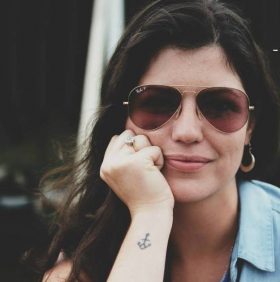 That experience, and others that followed, inspired her to launch a blog in 2011 to share her passion for bluegrass music in the Los Angeles area. The blog caught the attention of actor Ed Helms, who joined forces with Reitnouer in 2012 to launch The Bluegrass Situation, the country’s most popular roots music website.
That experience, and others that followed, inspired her to launch a blog in 2011 to share her passion for bluegrass music in the Los Angeles area. The blog caught the attention of actor Ed Helms, who joined forces with Reitnouer in 2012 to launch The Bluegrass Situation, the country’s most popular roots music website.
As executive director, Reitnouer divides her time between Los Angeles, New York, Nashville and everywhere in between. She recently co-produced the 2015 International Bluegrass Music Awards show in Raleigh, N.C., and two days later produced BGS’ annual festival, the LA Bluegrass Situation, at the Greek Theatre in Los Angeles. She spent her four years at Elon immersed in the film and television suites in the School of Communications, but also took classes outside of her major that challenged her worldview and allowed her to explore. The lessons she learned informs much of what she does today. For instance, when she is introduced to musicians she is not familiar with, she doesn’t just listen to their music; she looks at them with a critical eye—how they influence others, who they are connected with. “That’s what makes what I do valuable and what has made me successful, and it all comes from my training at Elon,” she says. “A lot of what I did at Elon really forced me to connect dots that people didn’t necessarily see.”
Facilitating success
“Elon graduates distinguish themselves in the marketplace because they are eager to learn.” —Shane Powers ’99, director with Credit Suisse
For the past 16 years, Shane Powers ’99 has helped Credit Suisse recruit more than 20 Elon alumni and student interns, advancing their careers and strengthening the Elon network. He is a big reason why Elon now has more than 50 alumni working at the company in both New York and Raleigh, and why the firm travels to Elon every year to recruit more students.
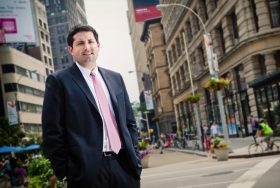 “We have found that many of the Elon candidates we interview for internships can go toe-to-toe with some of the core target Ivy schools from which we traditionally recruit,” he says. “The amount of leadership opportunities available on campus now really helps students prepare for the real world.”
“We have found that many of the Elon candidates we interview for internships can go toe-to-toe with some of the core target Ivy schools from which we traditionally recruit,” he says. “The amount of leadership opportunities available on campus now really helps students prepare for the real world.”
It’s something that doesn’t surprise Powers, who cherishes his own Elon experience. The small class sizes allowed him to easily build relationships with professors and classmates, leading to a stronger dialogue both inside and outside of the classroom. “As a result, I’m a better collaborator, not only from the team-oriented environment that Elon fostered while I was in school,” he says, “but also from the many opportunities that Elon has provided to work with other alumni on various boards and committees post-graduation.” He has witnessed how Elon’s reputation in the Northeast has soared since he first moved to New York after graduation. “When work colleagues are starting the application process for their kids, Elon always seems to be on their radar,” he says. “Year after year, it is great to hear the other peer schools that Elon is being stacked up against. It really has turned into an impressive list.”
Analyzing social complexities
“A lot of what Elon was for me was the people who cared about opening up the perspectives of young students.”—Iris Boutros ’97, senior program specialist with the International Development Research Centre
Iris Boutros ’97 always thought of herself as a global citizen, but it wasn’t until she spent a summer in a rural hospital in India during her first year at Elon that she was able to turn that worldview into a career path.
 “During that trip, I realized the social problems people face are more complex than the problems of the body,” says Boutros, who was planning to become a doctor. After seeing extreme poverty and social inequalities, she decided to continue studying biology and later obtain a master’s degree in public health and a doctorate in applied economics at Harvard University.
“During that trip, I realized the social problems people face are more complex than the problems of the body,” says Boutros, who was planning to become a doctor. After seeing extreme poverty and social inequalities, she decided to continue studying biology and later obtain a master’s degree in public health and a doctorate in applied economics at Harvard University.
A development economist, Boutros worked with the World Bank and lived in South Africa until the 2011 social upheavals in her native Egypt were too tempting to pass up. “It was so interesting to see a population speak so loudly with one voice,” she says. “What motivates me is the inequalities and opportunities that women and people face around the world,” she says, adding that she wants to continue analyzing how theories about development and equality of opportunity intersect with real life in the public sphere. She is thankful for her Elon education—her biology background gives an extra depth to her analysis—and the relationships she formed that have shaped her path. “A lot of what Elon was for me was the people who cared about opening up the perspectives of young students and showing them how to be better citizens of the world and understand the people around them,” she says. “They taught me how to be a well-rounded person.”
Creating his own path
“Borders are lines on a map; humans connect with humans. You don’t need to travel to be a global citizen.” —Matthew Jenks ’11, director of international relations with Accademia Europea di Firenze
Since first visiting the Accademia Europea di Firenze in Florence his junior year, Matthew Jenks ’11 was determined to return to Italy and work for the private school—even if it meant creating his own position. “Sometimes you need to plow your own ground,” he says.
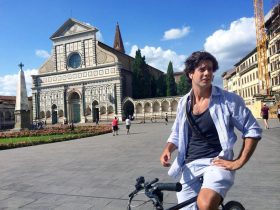 Now an administrator at the school, the creative writing graduate manages a range of responsibilities for the liberal arts school that takes pride in its academic excellence, cultural immersion and experiential learning.
Now an administrator at the school, the creative writing graduate manages a range of responsibilities for the liberal arts school that takes pride in its academic excellence, cultural immersion and experiential learning.
While living abroad has its challenges—he is the only native English speaker in his office—the lessons he is learning make it worthwhile. “Within a small private school, I see how a diverse international organization can succeed,” he says, adding that his time at Elon prepared him for much of the journey. Creative writing workshops taught him to embrace constructive criticism, while philosophy classes stimulated his mind and allowed him to grow as a thinker, and taught him to get out of his comfort zone and embrace his own ignorance. “The person who knows how much they don’t know is always the most enlightened in the room,” he says. Above all, he learned about the concept of global citizenship. “Borders are lines on a map; humans connect with humans,” he says. “You don’t need to travel to be a global citizen. Everyone is a citizen of the globe, whether they realize it or not. Humility and curiosity can empower anyone to experience the world through a new perspective in which you realize people are wonderfully strange and different, but completely connected.”
An instrument of diversity
“The best gift we can give as potential and current students, alumni, faculty, partners and investors, is our diverse backgrounds.” —Phil Collins ’08, regional account director with Imagination
The career path Phil Collins ’08 has taken is anything but conventional—and he wouldn’t have it any other way. Born and raised in Tennessee, he traveled abroad to Brazil his junior year before moving to Asia in 2009, where he has been working for almost seven years as an international marketer and communications specialist.
 Now a regional account director with the British marketing and communications firm, Imagination, Collins has worked with some of the world’s biggest brands, including Ford, Lincoln, GE, adidas, UBS and Suntech, and in some of the world’s fastest moving and most dynamic markets in Asia and the Middle East.
Now a regional account director with the British marketing and communications firm, Imagination, Collins has worked with some of the world’s biggest brands, including Ford, Lincoln, GE, adidas, UBS and Suntech, and in some of the world’s fastest moving and most dynamic markets in Asia and the Middle East.
Along the way, the business administration graduate has visited fascinating places and learned valuable lessons that complement the broad and well-balanced experience he had at Elon. “Thanks to Elon, I’m better at challenging the status quo because I now understand there’s more to see, do and achieve than what society presents,” he says. He is a firm believer in the power of diversity as an asset for personal and professional growth and supports the university’s commitment to diversity as part of its strategic plan. “We need a diverse set of investments in the types of students, partners, academics, internships and experiences at Elon,” he says. “The investment of diversity brings new people and skills with different and bold ways of thinking that actually have value for students. Once they go into the workforce, they become instruments of diversity.”


